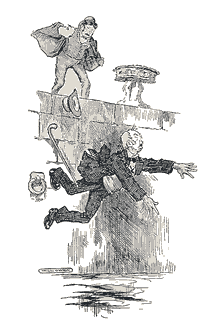W.W. Jacobs
Psst!… Have you heard the one about the scarecrow who was awarded a Nobel Prize? He was outstanding in his field.
Laughter is universal but we all have a particular brand of humour that we individually find irresistible. If an author can use his own experiences and channel them into your humorous vein then he is onto a winner.
One such author was W(illiam) W(ymark) Jacobs
 He was born in 1863. The son of a wharf manager, the family lived on the wharf at Wapping in cramped and crowded conditions. They were always hard up and the area was hardly desirable. Holidays were taken in Sevenoaks and East Anglia and provided the only relief to this rather depressing life. The early days spent with the characters that inhabited these areas provided him with a rich source of inspiration to fuel an output of some 270 short stories and articles (many appearing in 12 Books of short stories), 5 novels and a novella; nearly all of which were hugely successful.
He was born in 1863. The son of a wharf manager, the family lived on the wharf at Wapping in cramped and crowded conditions. They were always hard up and the area was hardly desirable. Holidays were taken in Sevenoaks and East Anglia and provided the only relief to this rather depressing life. The early days spent with the characters that inhabited these areas provided him with a rich source of inspiration to fuel an output of some 270 short stories and articles (many appearing in 12 Books of short stories), 5 novels and a novella; nearly all of which were hugely successful.
"My biggest fault, said the night-watchman gloomily, has been good-nature. I've spent the best part of my life trying to do my fellow creeturs a good turn. And what do I get for it? If all the people I've helped was to come 'ere now there wouldn't be standing room for them on this wharf. 'Arf of them would be pushed overboard-and a good place for 'em, too."
Apart from the world renowned horror story "The Monkeys Paw", WWJ is most famous for the creation of a series of stories narrated by Bill, The Nightwatchman, (about three sailors - Sam Small, Ginger Dick and Peter Russet) and by an old man seated on a bench with an ever empty glass outside the Cauliflower Public house, about Bob Pretty and the inhabitants of Claybury.
"The old man took up his mug and shifted along the bench until he was in the shade of the elms that stood before the " Cauliflower." … " My hearing ain't wot it used to be," he said tremulously. "When you asked me to have a mug o' ale just now I 'ardly heard you ; and if you was to ask me to 'ave another I mighn't hear you at all."
 With very little education (as far as is known for sure) he joined the civil service in 1879 at 16, and in 1883 became a clerk in the Post Office Savings Bank where he stayed until 1899. Totally bored with this work, and always short of money, he started to write. The stories sold well to the magazines, and in 1898 they started to appear in The Strand Magazine, then the goal of every aspiring author. He was made.
With very little education (as far as is known for sure) he joined the civil service in 1879 at 16, and in 1883 became a clerk in the Post Office Savings Bank where he stayed until 1899. Totally bored with this work, and always short of money, he started to write. The stories sold well to the magazines, and in 1898 they started to appear in The Strand Magazine, then the goal of every aspiring author. He was made.
 "The room was dark when 'e got there, and, arter standing listening a moment to Ginger and Peter snoring, he took off 'is coat and sat down on 'is bed to take 'is boots off. He only sat down for a flash, and then he bent down and hit his 'ead an awful smack against another 'ead wot 'ad just started up to see wot it was sitting on its legs."
"The room was dark when 'e got there, and, arter standing listening a moment to Ginger and Peter snoring, he took off 'is coat and sat down on 'is bed to take 'is boots off. He only sat down for a flash, and then he bent down and hit his 'ead an awful smack against another 'ead wot 'ad just started up to see wot it was sitting on its legs."
He left the POSB to write full time and a year later, at 36, he married an 18-year-old socialist/radical. It would appear that this was not an easy relationship and, although they had five children, they were never able to come to terms with each other. They separated but never divorced.
"And no woman minds whether wot she ses is true or not (he said, resuming his seat). Catch a man out in a lie and he looks a bit ashamed of himself; catch a woman out in a lie and she smacks your face for you."
 His early stories do not feature the dock life, and they did not until he had moved well away from there. "Distance lent enchantment to a view that needed it". He had made friends with an artist, Will Owen, with whom he built a great rapport. They even holidayed together and it is this special relationship that adds so much to the stories. Owen illustrated most of his magazine stories and a large number of the books.
His early stories do not feature the dock life, and they did not until he had moved well away from there. "Distance lent enchantment to a view that needed it". He had made friends with an artist, Will Owen, with whom he built a great rapport. They even holidayed together and it is this special relationship that adds so much to the stories. Owen illustrated most of his magazine stories and a large number of the books.
 "As I was a-saying, kindness to animals is all very well," he said to the wayfarer who sat opposite him in the shade of the "Cauliflower" elms ; "but kindness to your feller-creeturs is more. The pint wot you give me is gone, but I'm just as thankful to you as if it wasn't."
"As I was a-saying, kindness to animals is all very well," he said to the wayfarer who sat opposite him in the shade of the "Cauliflower" elms ; "but kindness to your feller-creeturs is more. The pint wot you give me is gone, but I'm just as thankful to you as if it wasn't."
Jacobs died 1n 1943 at the age of 80, Owen surviving until 1957.
The stories were immensely popular when first published, and are still sought after today. The books themselves are handsome, looking good on the shelves. And if you would like a good laugh, try reading one; you may be very surprised.
(Published on 1st Oct 2013 )

